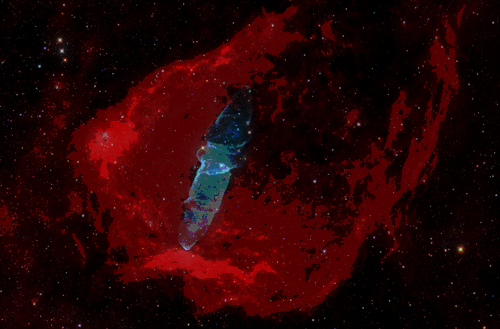
Ryan Génier
Good morning. It is October 27, and today’s image takes us 2,000 light-years from Earth. That is very far, but still in our little corner of the Milky Way Galaxy, which stretches about 105,000 light-years from end to end.
In this photo, courtesy of Ryan Génier, the large reddish object that covers much of the canvas is the Flying Bat Nebula. It is, essentially, a huge cloud of hydrogen gas. The Squid Nebula is shown in blue, indicating doubly ionized oxygen—which is when you ionize your oxygen once and then ionize it again just to make sure. (In all seriousness, it likely indicates a low-mass star nearing the end of its life).
The Squid Nebula is a recent discovery, first spotted by French astrophotographer Nicolas Outters in 2011. Génier has done a wonderful job teasing out its details in this photo, which was taken from his backyard in Kitchener, Ontario. “I took approximately 50 hours of data total but trimmed it down to the best 37 hours before stacking and processing,” he told me. “My backyard is fairly light-polluted (Bortle 7), which made this even more challenging to capture.”
The result sure seems like it is worth the effort. Have a great weekend, everybody.
Source: Ryan Génier
Do you want to submit a photo for the Daily Telescope? Reach out and say hello.

